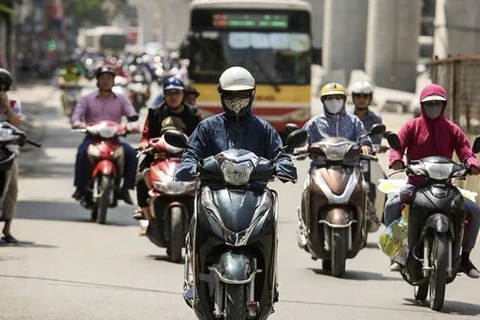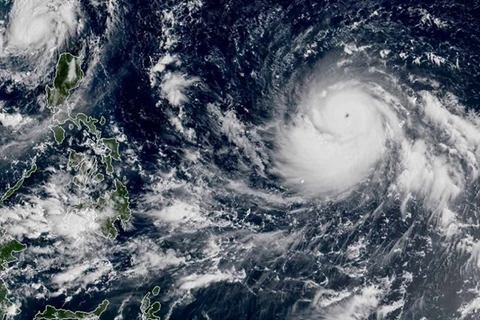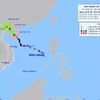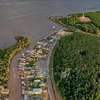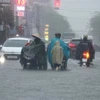Hanoi (VNA) – The northern and central regions have experienced severe and particularly severe heat waves in late July and early August. Some localities have witnessed even record temperatures in August, topping 40 degrees Celsius on several days, meteorologists said.
In the next 10 days, intense and particularly intense heat waves are forecast to continue while drought and water scarcity are likely to occur in certain areas in central and southern areas of the central region.
Temperatures exceed record levels
The National Centre for Hydro-Meteorological Forecasting said due to impact of the southwestern winds, which cause the Foehn effect, in combination with some other factors, the northern and central regions have recorded strong heat waves since July 25, with the highest temperatures of between 36 - 39 degrees Celsius.
Certain areas like Bac Me district (Ha Giang province), Bao Lac district (Cao Bang province), and Lao Cai province in the north have experienced particularly scorching heat of up to 39.5 degrees Celsius. In the central region, temperatures of up to 40 degrees have been reported in Da Nang city, 40.5 degrees in Tam Ky city of Quang Nam province, 40.1 degrees in Quang Ngai province, and 40 degrees in Phu Yen province.
Nguyen Van Huong, head of the climate forecasting division at the National Centre for Hydro-Meteorological Forecasting, noted record temperatures have been seen in many provinces and cities.
For example, the temperature of 39.5 degrees Celsius in Lao Cai in early August surpassed the record of 38.9 degrees in August 2016. Lang Son province saw a temperature of 37.7 degrees on August 5, exceeding the record high of 27 degrees on August 22, 1990. In Ha Dong district of Hanoi, the temperature of 39 degrees on August 6 also broke the record of 38.5 degrees on August 13, 2019.
Likewise, in the central region, Da Nang experienced 39.7 degrees Celsius on August 5, compared to the record of 39.5 degrees on August 15, 1977. The temperature in Quang Ngai city reached 40.1 degrees on August 1, topping the previous record of 39.9 degrees on August 19, 2019.
Huong predicted that from now to the end of August, localities in the central region may still undergo hot weather but heat waves will not as strong as those in recent days. Heat waves will also continue in the north but not for long.
Risk of water shortages in some areas
Giving more details, Phung Tien Dung, head of the hydrological forecasting division for the central, Central Highlands, and southern regions, said intense heat will linger through August 14 in the central region as a result of the southwestern winds’ impact.
On August 12, hot and extremely hot weather continued in the central region, mostly at 35 - 38 degrees Celsius, even over 38 degrees in some places. Temperatures of more than 35 degrees were recorded between 10am and 5pm. Meanwhile, humidity was relatively low, mainly at 50 - 60 percent.
Hot weather, low humidity in the atmosphere, and the Foehn effect caused by the southwestern winds have led to a surge in electricity demand, heightening risks of fires in residential areas and forests in this region.
This type of weather may also lead to dehydration, exhaustion, and stroke when people are exposed to high temperatures for a long time, Dung warned.
The heat will gradually ease across the central region from August 15 and remain mostly in its central areas, he added.
From August 11 to 20, total rainfall in this region will be 30 - 70 percent lower than average.
Flows on local rivers will by 23 - 80 percent lower than average, even over 80 percent less on some rivers in Quang Tri and Quang Nam provinces.
Given this, the National Centre for Hydro-Meteorological Forecasting predicted drought and water scarcity for certain areas, including those beyond the reach of irrigation works, in Thua Thien-Hue, Quang Nam, Quang Ngai, Binh Dinh, Phu Yen, and Ninh Thuan./.





